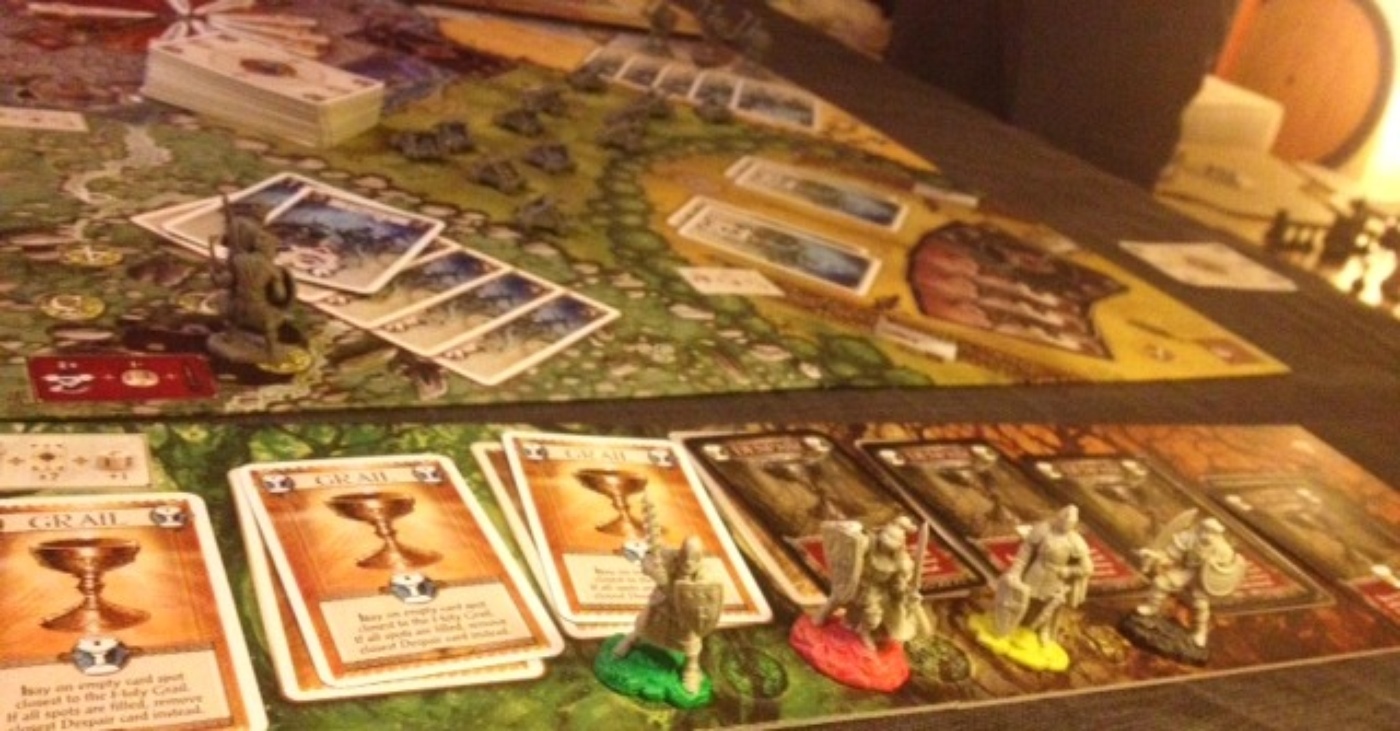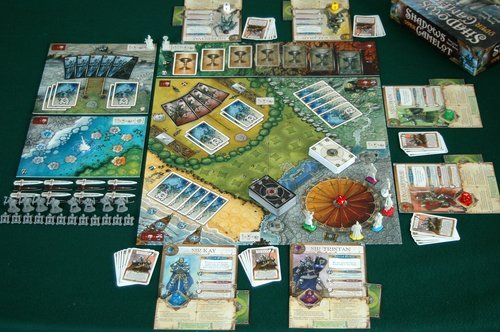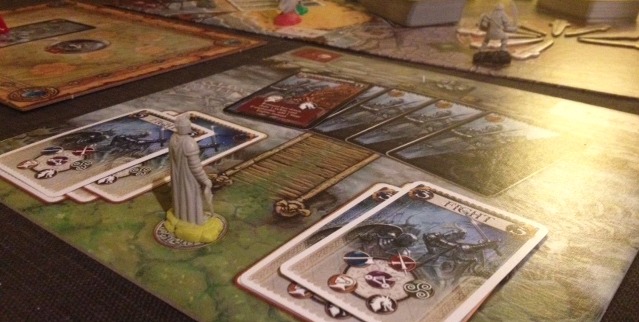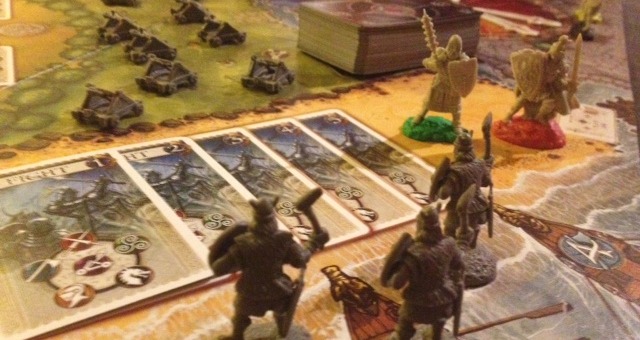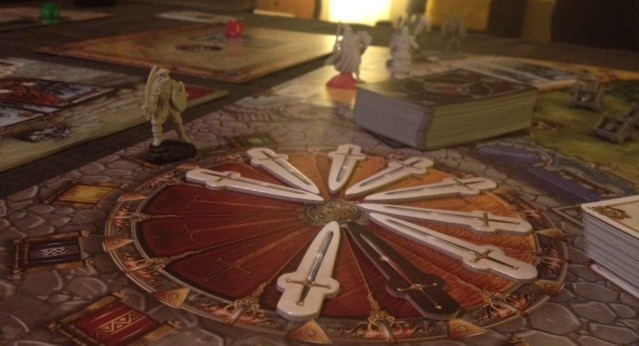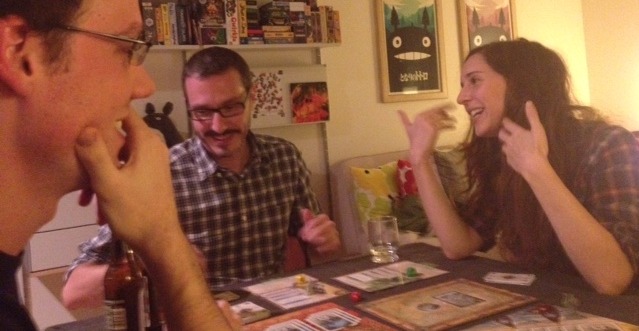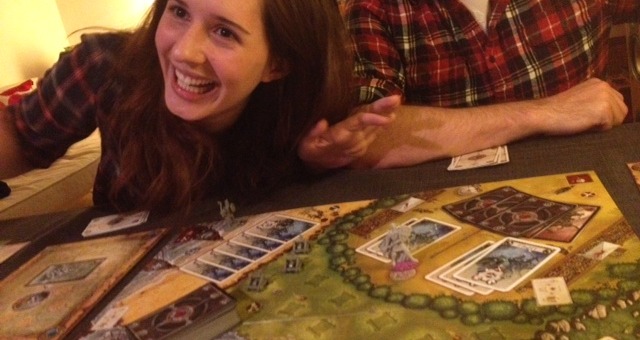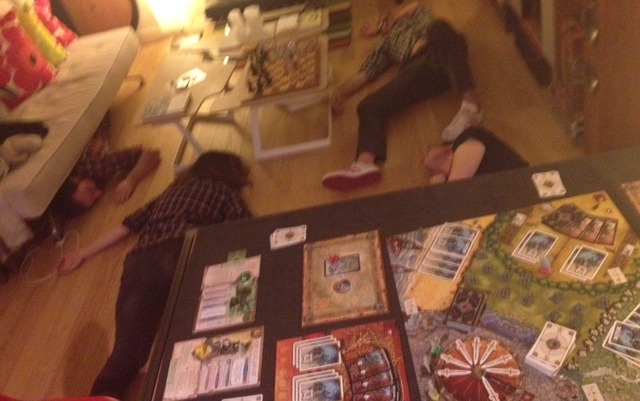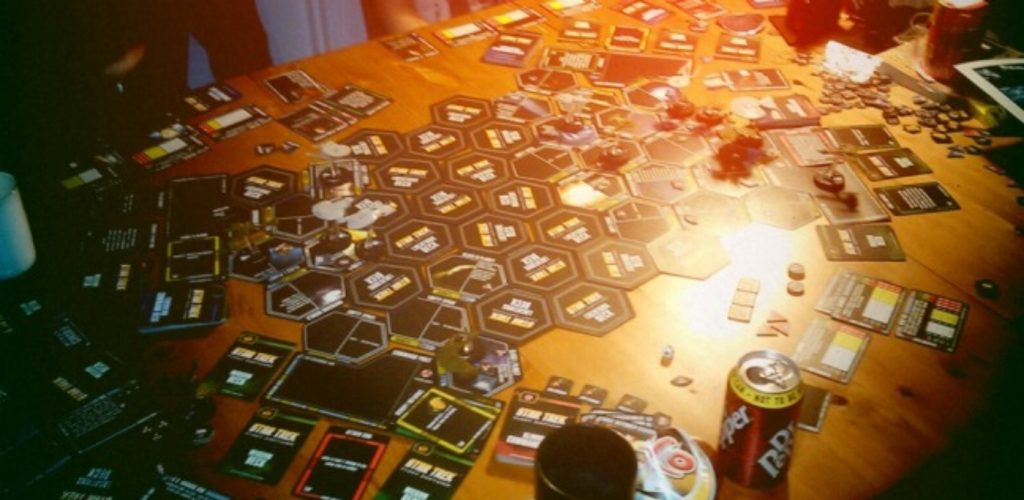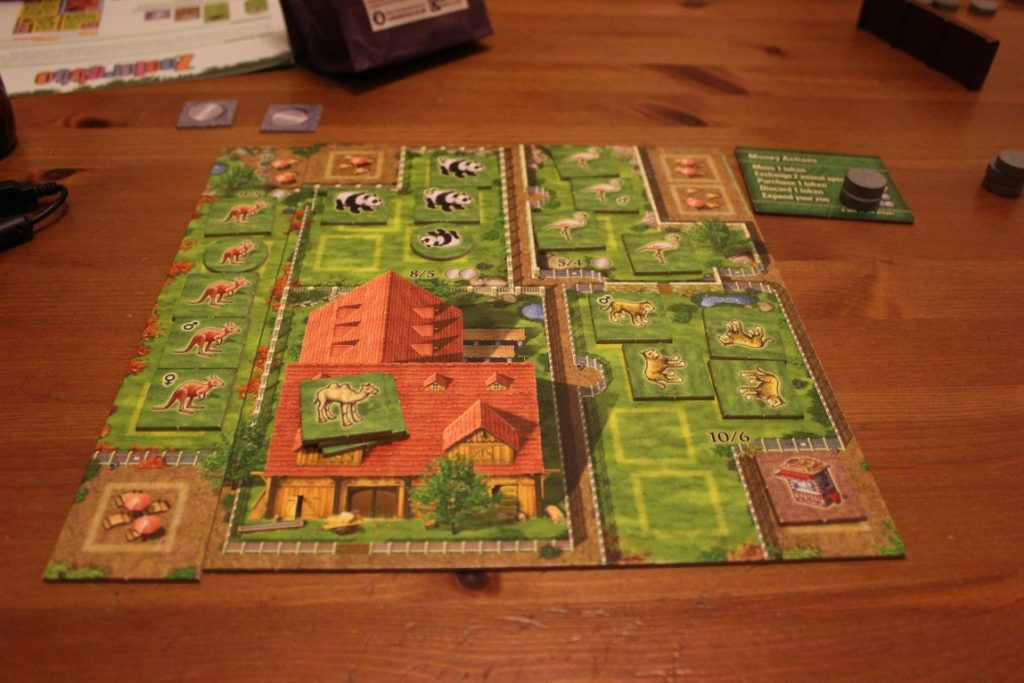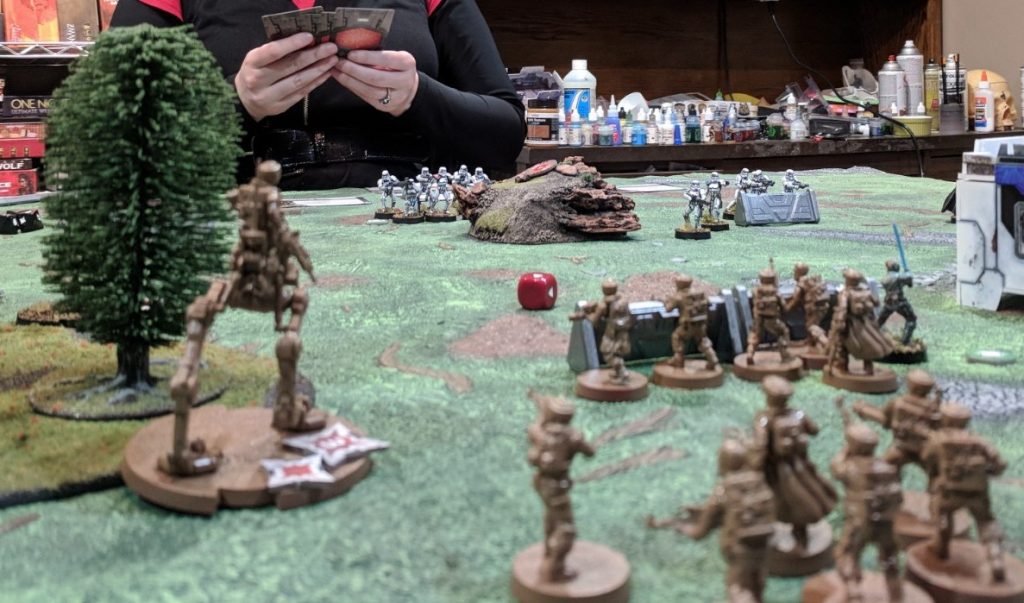Quinns: Oh god. OK.
Because board games age so goddamn well, running a board game site can be a bit like running a daycare centre. Those guys can’t rest because it might mean a kid getting stuck behind a radiator or someone eating a rock. We can’t rest because even if we stay on top of new games, we’re writing under the weight of every awesome game we’ve never played.
Shadows over Camelot is one such older game we need to tell you about. One of HUNDREDS. It never ends, but all the same we’re going to talk about it with the good humour of men throwing a shiny penny into a wishing well.
Or a fabled lake. Here’s a co-operative game from 2005 about King Arthur and his knights trying to save Britannia (a similarly momentous task to our own, so we sympathise) EXCEPT their quest has a twist like the deadly whip of a dragon’s tail. One player might be a traitor trying to doom the kingdom. If you can’t figure out who’s against you, or if they aren’t, all might be lost. Probably.
Also (because I forgot to take one (BOOZE)) here’s someone else’s photo of the game as a whole. I probably shouldn’t run an actual daycare centre. I might forget to let the kids out of their hutches, or whatever.
Thanks, someone else!
It’s the best possible sign if you can start enjoying a game during the rules explanation. The first thing that’s apparent about Shadows over Camelot is that the kingdom is comedically doomed. The Saxons are massing on your shores AND the Picts are massing in the mountains.
“OK,” you say. “Got it. How do we—”
Ah! We’re not finished. The Black Knight is also caving in skulls at a local tourney, and one of the game’s 3-7 players is going to have to
make an appearance there.
“Wow,” you say. “I’ll take care of tha—”
No! Just shut up! Sit down! That’s just the main board. See those extra boards? They’re yet more quests that we need to keep an eye on. One board covers the quest for the Holy Grail, another sees us trying to coax Excalibur from the Lady of the Lake like a cat from an air vent, and both of these are affected by a mythogical entropy whereby if we abandon them the artifacts will be lost, FOREVER.
“…”
…
“…”
…
“…what about that board…”
THAT board covers our duel with Lancelot, who’s gone rogue. Someone needs to travel there and battle him over many moons, a noble quest to be sure. Then once he’s dead we can totally pry the armour from his disgusting, twitching corpse.
“Ah! So if we can get the Grail, Excalibur and Lancelot’s Armour,
that’ll help, right?”
Yes. If we finish those side quests, the artifacts will help us NO NO NO IT’S A TRAP. If we complete any of the sub-boards we ALSO flip them over
to their other side, which is worse.
“So we’re doomed.”
Yeah.
Well, no. It’s just that, like other great co-op board games, Shadows over Camelot keeps a table of players rapt by keeping them in a permanent panic. Like Pandemic, like Ghost Stories, on every player’s turn something TERRIBLE HAPPENS, usually the evil advancement of one of the game’s six quests, at which point you get to throw yourself at something like a pompous doorstep wedging shut the gates of hell. You’ll do this by travelling there and playing a card from your hand.
“Wow, so—”
Importantly, the game isn’t about some binary win/fail state, as with Pandemic or Ghost Stories. You’re not a bunch of roguish underdogs, sassing your way towards the last chance saloon
“What the hell are you talking about I don’t even—”
You’re the KNIGHTS OF THE ROUND TABLE, men of duty, proper men with legs and everything, who will battle on until the last spoonful of blood dribbles from their open necks.
Here’s the nut. When a quest fails, you fill up the game’s round table with black sword tokens. When you succeed at one, you place white swords. The win state of the game is that when the table has the full set of twelve swords, you’ve got more white than black.
You WILL be overcome, but you will persevere. The Arthurian theme is in play, which is great.
“But you said something about a traitor?”
Are you still here? Yes, the traitor!
The traitor.
This is the game’s thing.
The traitor is in this photo. OR ARE THEY?
I’m actually going to skip over the simple game of how you beat quests. There’s nuance to do with how everyone has a hand of cards, as well as life points and powers, but I’m just going to crank up the volume dial on me shouting THIS GAME IS GOOD by stating that these mechanics are functional and interesting, but they’re eclipsed by the traitor.
One player might be a traitor who wins if you all lose. If that player is alive and secret at the end of the game, two white swords are FLIPPED to black. The horror.
Anyone can accuse anyone else of being a traitor instead of acting that turn, so you’re already playing with fire. Worse, if you’re wrong, you add a new black sword to the table. A shadow falls upon Camelot as brother accuses brother. Or sister!
Definitely a traitor.
Let me give you an example.
Let’s say you’re holding Lancelot’s armour, which is a heavy burden in more ways than one. You gain the power to draw two bad black cards on their turn instead of one, and pick which happens.
Just imagine. You draw two cards. They’re both awful. Since one would end the game in a Pict invasion, you play the card that bulks up the Black Knight with a ridiculous 7 strength card. The table erupts.
“WHAT,” cries Arthur. “You chose THAT?”
“Oh, bullshit,” spits Millicent. “We should accuse him.”
But you’re watching closely. Millicent’s been turning people against you for the whole game. It got so bad Paul wouldn’t even share his wineskin with you. Or his Pringles.
Now you go to meet her eye… and she looks away with a wry smile. Of course. She’s the traitor. This is your moment, where you save Camelot.
“I ACCUSE MILLICENT,” you declare, voiding your action for the turn in a firework display of bravado.
Millicent’s mouth falls open. She flips her loyalty card… and she’s Loyal. Another black sword is added to the round table. And your real life table explodes into accusations.
And Camelot falls and there never was a traitor and this happens:
Yes. No traitor at all. Because in a horrific bit of game design, when loyalty cards are given out, there’s always one Traitor card AND a number of Loyal cards equal to the number of players divided between you, with one of these thrown back in the box like a discarded chicken bone.
Always, there’s that glimmer of hope that maybe, maybe the Traitor card was the one thrown back in the box. It couldn’t be more perfect. “Brothers, we must have faith.”
What we’ve got here is just a solid, earthen game. It doesn’t dazzle, but it won’t ever let you down.
“There’s an expansion too, right?”
Yeah, Merlin’s Company. We didn’t play with it, but it extends and obfuscates the game’s puzzle once you feel like you’ve “solved” it, and lets you peak at 8 players and 2 traitors. Seems to be one to pick up if you want to extend the base game’s lifespan. Sort of like a blood transfusion. Or a marital aid.
“Or a holy grail?”
YES! Ha. You know, I think I invented you because I’m so used to writing with Paul.
“You invented me?
Yeah. You’re a narrative device. Don’t sweat it. Want to get a curry?
“You read my mind.”
I wrote your mind, actually.

